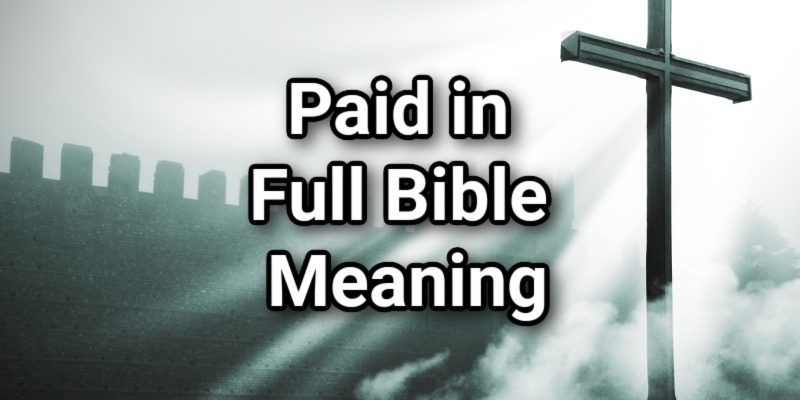Lord’s Library editors offer this paid in full Bible meaning with key Scriptures and commentary for your edification.
To obtain a paid in full Bible meaning, simply look to the Finished Work of Jesus Christ on the Cross. The core message of the Gospel is that mankind, dead in trespasses and sins (Ephesians), owed a debt it could never repay. See Ephesians 2:1: “And you hath he quickened, who were dead in trespasses and sins:” Knowing that the wages of sin is death, under the law, every transgression demanded just recompense. See Romans 6:23: “For the wages of sin is death; but the gift of God is eternal life through Jesus Christ our Lord.”
Yet Jesus Christ stepped in as our substitute and satisfied that debt (paid in full meaning) by offering Himself as the once-for-all sacrifice. John 19:30 records the moment: “When Jesus therefore had received the vinegar, he said, It is finished: and he bowed his head, and gave up the ghost.”
The Greek term translated “It is finished” is tetelestai, an accounting term meaning “paid in full.” As such, this statement was not a cry of defeat but a shout of victory—the debt had been paid, the work completed, the sacrifice accepted by the Lord God.
Paid in Full Bible Meaning
The Word of God says that Christ’s death was substitutionary and fully sufficient to save sinners. See Isaiah 53:5: “But he was wounded for our transgressions, he was bruised for our iniquities: the chastisement of our peace was upon him; and with his stripes we are healed.” Hebrews 10:10 confirms it: “By the which will we are sanctified through the offering of the body of Jesus Christ once for all.”
Unlike the need for continual sacrifices in the Old Testament days that could never take away sins, Christ’s sacrifice did what the law could not. See Hebrews 10:4: “For it is not possible that the blood of bulls and of goats should take away sins.” See next Hebrews 9:12: “Neither by the blood of goats and calves, but by his own blood he entered in once into the holy place, having obtained eternal redemption for us.”
The debt of sin was settled not by righteous works, penance, or striving, but by grace through faith in Jesus Christ. See Ephesians 2:8-9: “For by grace are ye saved through faith; and that not of yourselves: it is the gift of God: Not of works, lest any man should boast.”
This means the believer does not contribute to the payment—he trusts in the One who already paid; Jesus Christ. See Romans 3:24-25: “Being justified freely by his grace through the redemption that is in Christ Jesus: Whom God hath set forth to be a propitiation through faith in his blood, to declare his righteousness for the remission of sins that are past, through the forbearance of God;”
The word “propitiation” means a full satisfaction of wrath, showing that the payment was complete and acceptable before God.
Colossians 2:13-14 further shows the paid in full concept: “And you, being dead in your sins and the uncircumcision of your flesh, hath he quickened together with him, having forgiven you all trespasses; Blotting out the handwriting of ordinances that was against us, which was contrary to us, and took it out of the way, nailing it to his cross;”
The “handwriting of ordinances” is the record of our sin debt, and Jesus erased that record by nailing it to the cross. Praise God! See 1 Peter 2:24: “Who his own self bare our sins in his own body on the tree, that we, being dead to sins, should live unto righteousness: by whose stripes ye were healed.” In bearing our sins, Jesus bore the penalty, and in rising again, He confirmed that the payment had been accepted and death destroyed.
Because the debt was paid in full, the believer now stands justified before God, not by law, but by faith. See Romans 5:1: “Therefore being justified by faith, we have peace with God through our Lord Jesus Christ:” Galatians 2:21 then makes the implication clear: “I do not frustrate the grace of God: for if righteousness come by the law, then Christ is dead in vain.”
As one can see, the paid in full Bible meaning is absolute victory through Jesus Christ, who fully satisfied the debt of sin by His death and resurrection. This outlines the doctrine of salvation by grace through faith. We leave you with Romans 8:1: “There is therefore now no condemnation to them which are in Christ Jesus, who walk not after the flesh, but after the Spirit.”
Lord's Library is a Christian resource hub. Our editors use a variety of internet research methods like search engines, audio and video, AI, consultations with ministry leaders in the field, and more. Lord's Library should never be a substitute for reading your Bible daily as the Scriptures are to be our final authority on all matters. Lord's Library participates in affiliate programs. We may make a small commission from products purchased through this resource.












